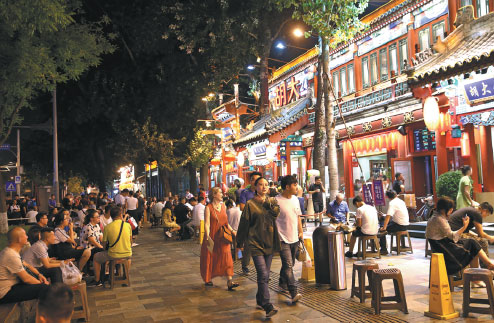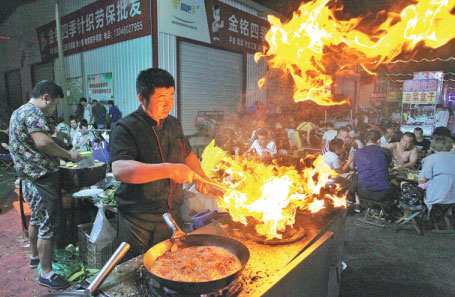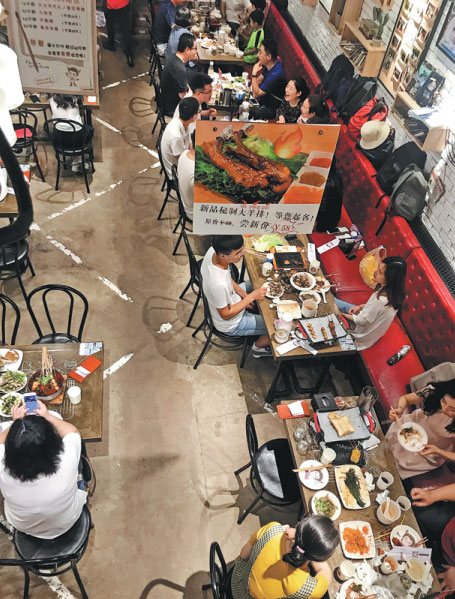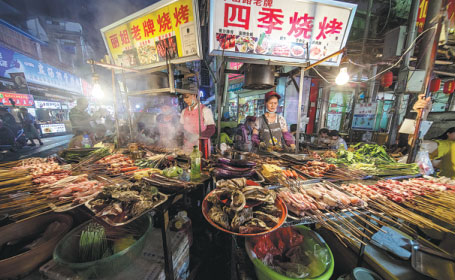Late-night diners making a meal of nocturnal nibbles
Growing numbers of young people are defying convention and eating long after dark. Wang Xiaoyu reports.
You mostly see them after 10 pm; crowds of late-night diners gathering and advancing slowly along sidewalks under the fluorescent city lights.
There are the bleary-eyed office workers emerging after overtime, the jabbering partygoers looking to replenish their energy, and the barbecue addicts happy to line up for two hours to get into hot spot restaurants.
As daytime leisure opportunities are often edged out by long, intense working hours, a growing number of young Chinese are abandoning the established norm of three meals a day and making late-night bites a staple of their lives.
"Barbecue skewers, hotpot and grilled seafood are some of my obsessions at night. We don't limit our choice of venue - both street vendors and well-known food chains can provide satisfactory experiences," said Gao Nan, a 24-year-old web developer in Beijing, who visits restaurants to eat late almost every weekend.
"The salty, greasy fare and the rumble of the crowd, all under the cover of darkness - it's an unusual combination that somehow helps me escape the daily grind, recharge and prepare for another week of hectic schedules," Gao said.
She knows that on the night streets of Beijing, she will never be alone among the sleepless souls in search of food after a stressful week.
According to a report published in March by the China Tourism Academy and Meituan Dianping, the country's leading e-commerce platform for services such as food deliveries and bike sharing, Beijing, Shanghai and Shenzhen, Guangdong province, top the charts for the cities with the highest spending on food per person long after darkness has fallen.
Even though expenditure between 6 pm and 9 pm - the usual time for dinner - accounts for nearly 65 percent of the total, spending on food between 9 pm and midnight covers about 27 percent, it said.
The Beijing authorities have recently acknowledged the trend by rolling out a series of measures to spur consumption after dark, including urging late-night eateries to improve the services they offer, establishing nighttime landmarks and extending the operating hours of the city's subway lines.
In the face of the growing trend, some health experts have voiced objections to such unorthodox dietary habits. Fan Zhihong, a professor at the College of Food Sciences and Nutritional Engineering at China Agricultural University and one of the best-known nutritionists on Chinese social media, said binge eating late at night is linked to a higher risk of developing cardiovascular disease.
A social aspect
However, Gao, who often satisfies her late-night hunger with lamb or vegetable skewers dripping with oil, claims to stick to a healthy eating pattern most days.
She said she initially opted to go out with friends late at night simply because it was hard to find a daytime slot when everyone was available.
"The 996 work schedule (9 am to 9 pm, six days a week) is common among web developers like me. It was such a bummer when we used to hang out at regular dinner times and our chats were interrupted by calls from supervisors, or we could not help checking our workplace chat groups for fear of a missed notification," she said.
Late-night hours offer precious periods for young professionals to become fully immersed in social gatherings, she said, adding it was only recently that she discovered the pleasures of sharing a plate of grilled lamb skewers after 10 pm.
"Going out at night lowers my inhibitions - it's easier to get emotional, excited and pumped up," she said, adding that even without alcohol, late-night meals often make her feel tipsy. Even better, she rarely spends more than 100 yuan ($14) on her "feast".
After spending at least five days a week wearing sensible clothes and black-rimmed glasses as she types computer codes in a cramped cubicle, Gao tends to dress up and wear light makeup for her nighttime excursions.
"I am not trying to impress anyone by styling my outfit," she said. "I just want to look different in that setting, where I deviate from my usual dietary habits and normal sleeping hours."
She compared eating sumptuous food with friends late at night to taking a hot bath. "Simple though it is, some people choose the latter to unwind, but I prefer the former as a mental break," she said.
Like Gao, Wu Tong, 26, who works for a financial company in Beijing, emphasized the social aspects of late-night meals.
As a veteran nocturnal diner, he said he is no longer driven by a great liking for "crowds of people" and "simply chilling out" - the things that initially lured him to the nighttime food stalls that lined the backstreets outside his campus.
"Nowadays, I suggest late-night gatherings out of a desire to catch up with my friends' latest situations and vent my frustrations about work or issues in my personal life," he said.
Wu is now a frequent weekend patron of nighttime landmarks such as the trendy Sanlitun village and the Guijie gourmet strip in Dongcheng district, where the aroma of bubbling hotpot broth wafts from well-decorated eateries and customers form long lines outside food chains that specialize in crawfish.
"The routine is pretty much the same as the old times because we gulp down grilled seafood and sip beer. But in addition to talking big and daydreaming, there are also more serious discussions about things such as career prospects, relationship anxieties and potential investment plans," he said.
"We all have unresolved issues in life that upset or baffle us, and thrashing them out with friends over a hearty meal always makes me feel better."
Barbeque boom
As a one-liner often quoted by zealous foodies says, "There are no obstacles in life that cannot be overcome with a barbecue feast - and if there are any, go and eat more skewers."
Though a wide range of food joints have sprung up as part of Beijing's booming late-night food scene, barbecue skewers remain the signature dish.
Wang Jian, a physician who specializes in cancer care, pinpointed the need for young go-getters to share their joys and troubles over the intimate settings only barbecue skewers can provide. Two years ago, he set up The Lancet in Haidian district, the first in his chain of barbecue eateries.
"When I started my medical career at the hospital, it seemed only fair to escape the disturbing feelings prompted by my work with a barbecue feast with friends and colleagues after a night shift," he said.
He founded the restaurant to provide a relaxing environment for young professionals like himself, people seeking a place to fill their stomachs and let off steam, after "street food" left him less than satisfied.
"I saw some small food stalls that used weeks-old oil for cooking, which was disgusting and harmful to health," he said.
Cheng Si, Wang's business partner and also a healthcare practitioner, said her medical training taught her that personal emotions, positive or negative, should be digested alone. In the past, she used to unwind and replenish her energy levels alone at home during the small hours, but she is grateful to have found an alternative.
"Now, I am able to come to the barbecue restaurant and mingle with coworkers or other customers," she said, adding that the regular-world ambiance, as opposed to the life-and-death tension in the hospital wards, helps unravel her emotional knots.
Fast-food focus
Despite the growth in nocturnal dining on the capital's streets, it is possible that takeouts may carve a name for themselves in the late-night culinary world thanks to the rapid development of online delivery services.
Round-the-clock convenience chains, such as 7-Eleven, Family Mart and Bianlifeng, are also likely to gain popularity among late-night diners.
Zhao Shen, a sports news editor who usually finishes work after midnight, said onigiri (Japanese rice balls) or instant noodles are his usual late-night fix, despite having eaten a full diner a few hours earlier.
"It's unreasonable to call up friends at midnight and ask them to dine with me," he said. "So the most sensible approach is to eat fast-food alone."
Liu Ziyan, a former employee at a fashion magazine, said her first instinct to deal with late-night cravings is to open a food delivery app and order a serving of crawfish and some marinated duck's feet.
"Going out with friends is simply too much hassle," she said. "I enjoy it when we get together and share food, but eating alone at home also appeals to me, because it feels like I finally have some time to myself, and solo dining allows me to chill out for a few moments."
Contact the writer at wangxiaoyu@chinadaily.com.cn
|
|
|
A chef cooks meals for diners at a night market in Jinan, Shandong province, in June.Yang Song/for China Daily |
|
|
|
|

(China Daily Global 09/12/2019 page5)






















